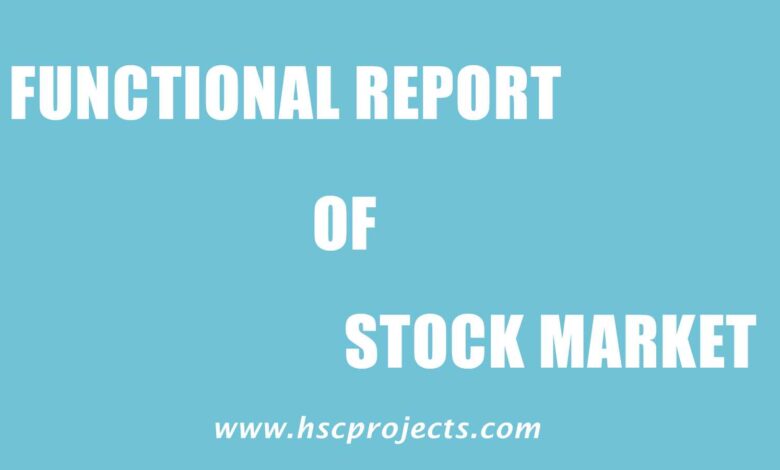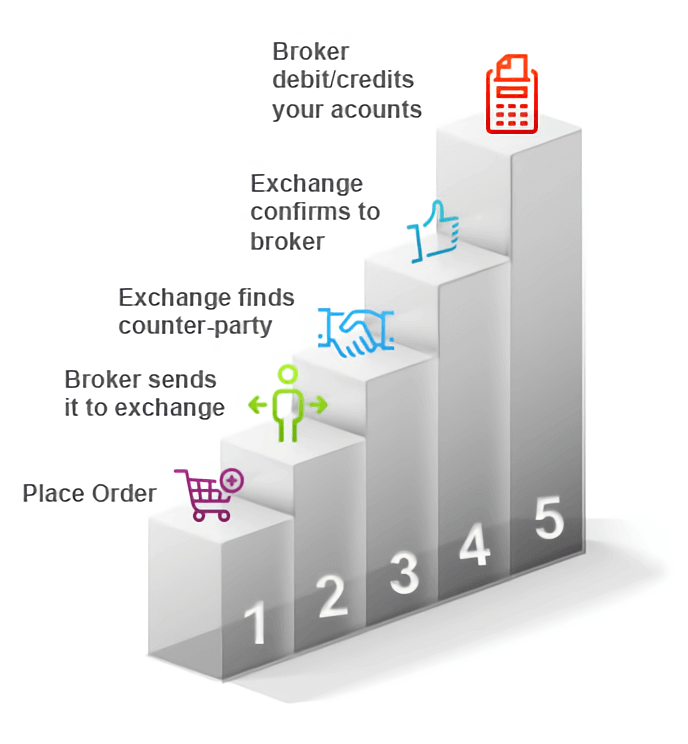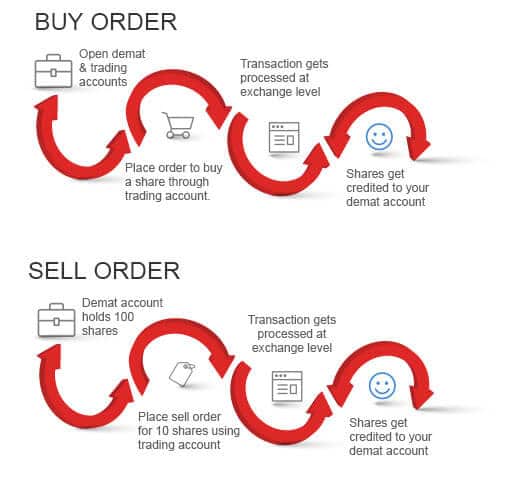
Functional Report of Stock Exchange – HSC Project Maharashtra Board
INTRODUCTION:
Introduction for Functional Report of Stock Exchange
A stock market, equity market, or share market is the aggregation of buyers and sellers of stocks which represent ownership claims on businesses; these may include securities listed on a public stock exchange as well as those only traded privately. A stock exchange is a place where or an organization through which individuals and organizations can trade stocks. Many large companies have their share listed on a stock exchange. This makes the stock more liquid and, thus, more attractive to many investors. It may also act as a guarantor of settlement.
Participants in the stock market range from small individual stock investors to larger trader investors, who can be based anywhere in the world, and may include banks, insurance companies, pension funds, and hedge funds. Stock market participation refers to the number of agents who buy and sell equity-backed securities either directly or indirectly in a financial exchange. Participants are generally subdivided into three distinct sectors; households, institutions, and foreign traders. Direct participation occurs when any of the above entities buys or sells securities on its behalf on an exchange. Indirect participation occurs when an institutional investor exchanges a stock on behalf of an individual or household.
A stock exchange facilitates stock brokers to trade company stocks and other securities. A stock may be bought or sold only if it is listed on an exchange. Thus, it is the meeting place for stock buyers and sellers. India’s premier stock exchanges are the Bombay Stock Exchange and the National Stock Exchange.
AIMS AND OBJECTIVES :
An association, organization, or body of individuals, whether incorporated or not, established to assist, regulate, and controlling business in buying, selling, and to deal in securities. The essential objectives of Stock Markets are given below:
- To provide a fair, transparent, and efficient securities market to investors using the electronic trading system.
- To establish a nationwide trading facility for equities and debt instruments.
- To ensure equal access to investors all over the country through an appropriate communication network.
- To improve the standard of the securities market to the international level.
- Provide an organized, fair, transparent, and efficient market for trading securities, and secure a safe environment for trading securities
to deepen trust in the stock market, therefore, to serve the national economy. - To create an attractive, safe, competitive, transparent, and credible investment environment.
- To develop processes, methods, and systems for trading securities in the stock market according to the latest international standards.
- To develop and deliver an outstanding service to the related parties.
- To disseminate trading information to the most significant possible number of traders and interested parties.
- Enhance the public awareness of all segments of society, while devoting special attention to traders of securities.

METHOD AND METHODOLOGY :
- The primary sources of collection of the data would be from SEBI, Derivatives Exchange, Bombay Stock Exchange (BSE) and National Stock Exchange (NSE), MCX, NCDEX, Financial Institutions, Merchant Bankers apart from brokers who would be trading in these exchanges. Purposeful Random Sampling technique has been administered for collecting primary data.
- The research would include the study of the existing mechanism of various methods of trading in stock exchanges (derivatives, badly, etc.), its history, success, and failures primarily.
- Study the emergence of derivatives method of trading in the world and India.
- They are studying its regulatory structure, comparing it with the badla system, by finding out their weaknesses and strengths.
- To Study= the impact of derivatives trading on the Indian Financial System.
- Analyzing them and recommending ways to stabilize the regulatory system of derivatives.
- Descriptive and Exploratory research methods are used to gather and analyze data. Exploratory research would rely on the collection of data through secondary research such as reviewing available literature and/or data, or qualitative approaches such as informal discussions with respondents (here brokers, managers in Financial Institutions and Banks, management of the regulatory bodies) and more formal procedures through in-depth interviews, focus groups, projective methods, case studies or pilot studies. Internet research methods, like posting the questionnaire through Google support, would be used to reach the respondent. The results of the exploratory research would provide significant insight into a given situation or concept.
DETAIL REPORT OF PROJECT :
The government of India has enacted an act (SEBI Act 1952), which provides for the establishment of a board to protect the interest of the investor in securities. The SEBI has emerged as a monitoring institution of the country for the development and regulation of the stock market, SEBI has issued from time to time guideline to insider trading listing of securities, registration of intermediaries mutual funds, etc.
An elected body of members does the management of stock exchange. Different names know these bodies in the various stock exchange; for example, a ‘governing board manages the BOMBAY, INDORE, and AHMEDABAD stock exchange.’ ‘Council of management’ governs the MADRAS stock exchange. A committee manages the CALCUTTA stock exchange. While the ‘ board of director’ manages the stock exchange.
These governing bodies are authoritative bodies enjoying the extensive administrative power of management and control over their respective stock exchange the day-to-day function of the stock exchanges are executed by the sub-committee like the ‘defaulters committee’ ‘listing committee,’ ‘settlement committee’ etc.
The SEBI closely monitors the outstanding position of top buying member-brokers and top-selling member-brokers daily. For this purpose, it has developed various market monitoring reports based on specific pre-set parameters. These reports are scrutinized by officials of the Surveillance Dept. to ascertain whether a member-broker has built up excessive purchase or sale position compared to his usual level of business. Further, it is examined whether purchases or sales are concentrated in one or more scrips, whether the margin cover is adequate, whether transactions have been entered into on behalf of institutional clients and even the quality of scrips, i.e., liquid or illiquid is looked into to assess the quality of exposure. The Exchange also scrutinizes the pay-in position of the member-brokers, and the member-brokers have more considerable funds pay-in posts are at times, at the discretion of the Exchange, required to make advance pay-in on T+1 day instead of on T+2 day.

The marketing of the securities on the stock exchange can be done through a member of the stock exchange. This member can be either individuals or corporate bodies.
For the process of trading on a stock exchange, there is the basic need for a transaction between an individual and the broker to execute the customer’s order to buy or sell on the stock exchange trading ring. The exchange of scrip between the member of the trade in the form of buying or selling is called trading
The broker is a member of the recognized stock exchange and helps the customers in buying or selling the securities for the brokerage that he receives.
ANALYSIS OF DATA :
I have to admit I am an avid believer that everyone should invest in the stock market. We are in the age of online discount brokerages and super-fast connections for both wireless and wired. Combine that with companies taking away pension plans and allowing employees to manage 401K’s and more people working a contract basis. The average person will have to have some basic knowledge of how the stock market works and take control and actively manage their retirement portfolio. We are now in the AG (After Google) age, and with that, access to information is only a search away. With so much data and companies and Internet Portals offering free financial data on almost every publicly traded company I will present how to use 3 simple techniques from big data to profit from the stock market and take control of your financial future whether you are techie geek or a novice computer person using these methods will make your money. There are different types of markets in a nation. Here is a detailed project on forms of markets in economics
- Method 1: Making Money from Market Mood or Market Sentiment Trading
One of the most profound facts is that hedge funds, mutual fund managers, and large banks spend large amounts of money. It is that you will have to spend money from companies that provide data sets or plenty of data for investors. Companies such as FactSet, Capital IQ, and CRSP (Center for Research in Security Prices) provide data and datasets for large amounts of money. Datasift (Datasift.com) allows anyone to input data from accessible social media sources and websites and outputs the data to your app or tool that you choose. This method may cost more money, and you may need a certain level of technical knowledge. Still, it is an affordable solution and worth considering if you have the additional time and money to trade from market sentiment. While this may not be the best method, but it is a simple method to begin using to make money from the market mood.
- Method 2: Social Media Algorithm
Another technique that I have found for investing in market mood and sentiment is to use the Finsesnt website http://www.finsents.com/. This website helps investors scan financial resources and content for the spirit of the market. I would use this tool to find a sense of a particular sector, such as real estate or commodity. Then you may develop your algorithm from Quantopian.com and create a trading algorithm from that website. The figure above displays how investors can retrieve the information and then use an algorithmic engine to make a trading decision. This can powerful as you build your trading algorithm based on market sentiment from significant data software.
- Method 3: Market Sentiment Trading Platform
Since hedge funds and institutional investors with a large amount of capital are already mining through the web and using social media and blogging websites and trading from the trend, the latest tool will be the average retail investor to do the same. One Hedge fund company Derwent Capital has already developed a trading platform named DCM Dealer, which has an Interface to allow retail investors to trade on market sentiment from data from Facebook, Twitter, and other social media sites. The interface will help retail investors review the market sentiment and build and trade the market sentiment of the overall market or individual equities or sectors they may choose.
FEATURES/ CHARACTERISTICS OF STOCK EXCHANGE MARKET:
Characteristics or features of the stock exchange are:-
- The market for securities: Stock exchange is a market where securities of corporate bodies, government, and semi-government bodies are bought and sold.
- Deals in second-hand securities: It deals with shares, debentures bonds, and such securities already issued by the companies. In short, it deals with existing or second-hand securities, and hence it is called the secondary market.
- Regulates trade in securities: Stock exchange does not buy or sell any securities on its account. It merely provides the necessary infrastructure and facilities for business in securities to its members and brokers who trade in securities. It regulates trade activities to ensure free and fair trade.
- Allows dealings only in listed securities: In fact, stock exchanges maintain an official list of securities that could be purchased and sold on its floor. Securities which do not figure in the official record of the stock exchange are called unlisted securities. Such unlisted securities cannot be traded on the stock exchange.
- Transactions effected only through members: All the transactions in securities at the stock exchange are made exclusively through its authorized brokers and members. Outsiders or direct investors are not allowed to enter the trading circles of the stock exchange. Investors have to buy or sell the securities at the stock exchange through the authorized brokers only.
- Association of persons: A stock exchange is an association of persons or body of individuals which may be registered or unregistered.
- Recognition from Central Government: Stock exchange is an organized market. It requires attention from the Central Government.
- Working as per rules: Buying and selling transactions in securities at the stock exchange are governed by the laws and regulations of the stock exchange as well as SEBI Guidelines. No deviation from the rules and guidelines is allowed in any case.
- Specific location: Stock exchange is a particular marketplace where authorized brokers come together daily (i.e., on working days) on the floor of the market called trading circles and conducts trading activities. The prices of different securities traded are shown on electronic boards. After the working hours, the market is closed. All the working of stock exchanges is conducted and controlled by computers and electronic systems.
- Financial Barometers: Stock exchanges are the economic barometers and development indicators of the national economy of the country. Industrial growth and stability are reflected in the index of the stock exchange.

FUNCTIONS OF STOCK MARKET :
- The continuous and ready market for securities: Stock exchange provides a swift and permanent demand for purchase and sale of securities. It provides an available outlet for buying and selling of securities. The stock exchange also acts as an outlet/counter for the sale of listed securities.
- Facilitates evaluation of securities: Stock exchange is used in the assessment of industrial securities. This enables investors to know the true worth of their holdings at any time. A comparison of companies in the same industry is possible through stock exchange quotations (i.e., price list).
- Encourages capital formation: Stock exchange accelerates the process of capital formation. It creates the habit of saving, investing, and risk-taking among the investing class and converts their savings into a profitable investment. It acts as an instrument of capital formation. Also, it acts as a channel for right (safe and productive) investment.
- Provides safety and security in dealings: Stock exchange provides safety, security, and equity (justice) in dealings as transactions are conducted as per well-defined rules and regulations. The managing body of the exchange keeps control of the members. Fraudulent practices are also checked effectively. Due to various rules and regulations, stock exchange functions as the custodian of funds of genuine investors.
- Regulates company management: Listed companies have to comply with rules and regulations of the concerned stock exchange and work under the vigilance (i.e., supervision) of stock exchange authorities.
- Facilitates public borrowing: Stock exchange serves as a platform for marketing Government securities. It enables the government to raise public debt easily and quickly.
- Provides clearinghouse facility: Stock exchange provides a clearinghouse facility for members. It settles the transactions among the members quickly and with ease. The members have to pay or receive only the net dues (balance amounts) because of the clearinghouse facility.
- Facilitates healthy speculation: Healthy speculation keeps the exchange active. Reasonable thinking is not dangerous but provides more business to the transaction. However, excessive speculation is undesirable as it is hazardous to investors & the growth of the corporate sector.
- Serves as Economic Barometer: Stock exchange indicates the state of health of companies and the national economy. It acts as a barometer of the economic situation/conditions.
- Facilitates Bank Lending: Banks quickly know the prices of quoted securities. They offer loans to customers against corporate securities. This gives convenience to the owners of securities.
CONCLUSION:
Conclusion for Functional Report of Stock Exchange:
These tools and methods are simple and should be viewed as the only tool in a toolset to manage your stock or retirement portfolio. Of course, you should do your research and make sure to come up with additional methods. The reason for me writing this article is for the average retail investor to begin to take control of their financial future and use the same tools that the significant hedge funds and banks use to make money from the stock market. I wish everyone reading this the best of luck investing.
You can make a lot of money investing in stocks or trading in the stock market, but it is not something for the new investors. Care must be taken when it comes to stock investments. … In investing, the riskier the investment, the bigger the chance of making more money
There are lots of financial scams that are happening day by day, and the unaware public gets trapped by the fraudsters and destroys their hard-earned money and wealth. Thus poor investors and the nation’s wealth are destroyed. Cheat always comes up with new ideas to trap unaware or new investors. Stock Market is a million-dollar business, so here maximum tricks can be found to catch the poor investors by their various more modern fraudulent activities every day like publishing fake balance sheets by company, by giving false news like bonus, dividend, takeovers, merger, new orders, expansions, etc. to arouse people to buy their company shares at unfair price.
Finding a stock to buy is about as easy as logging onto the Internet, opening the newspaper, or picking up the phone. The trick is deciding which stock to buy. Buying and selling shares can be done with a single trading account that you set up and manage yourself, but many investors (both individual and institutional) still call their brokers.
Deciding which stock to buy, or which kinds of stocks to buy, requires you to consider your goals in life, your age, your cash needs, future cash needs you might have (retirement, college, etc.), your tax situation, the nature of your other investments and how much risk you’re willing to take. That’s a lot to consider, which is why financial advisors come in handy for investors wondering what to do.
DISCUSSION :
After having a chat with my friends about what is a stock market, how does it works and if one should invest his/her money in the stock market or not, Here are the things that I got in response from them
Firstly they lacked knowledge about how does stock market work. After discussing it with them, we came to the point that one should be patient while investing in a stock exchange or stock market. Their opinions were that one should only spend the money in the stock market, which he can afford to lose or can live satisfactorily without that money for a long, long time.
No one likes to lose money. Moreover, the pain threshold of some is higher than it is with others. If you’re considering an investment in the stock market and the thought of a loss upsets you, you probably shouldn’t invest. However, when you spend, there are several things you should know to increase your chances of winning.
YOUR OPINION/ SUGGESTION :
After reading how the stock market works and what are the concepts required for entering into the share market world, I would suggest that one must only get into the share market if he genuinely wants to do it wholeheartedly. If you are someone who is in it for some quick profit, then this is not the game for you. Share market requires lots of patience and proper judgment on when to buy and sell a stock. One must also consider this that he/she should only invest money that he/she can afford to lose. If you are earning 10000rs per month, and your budget is 9000rs. Your savings are 1000rs only then you should always think twice before investing that money in the stock market because if the share market doesn’t work for you at the start, then there are high chances that one will be wrecked and sooner or later you will face financial problems. So it’s always better to invest money that you can afford to lose. One should think of it as Bad debts with 50%-50% of return chances. Stock market exchanges are often called gamble, so play safe has patience and keep tracking the company movements/news of which you have bought shares to predict when the shares prices are going to scale up or dropdown.
When it comes to investing in stocks, there is so much to learn. Once a person is educated on the subject, there’s a lot of money to be earned. You are about to be given some advice that can have you becoming a stock market investing professional and making money in no time.
Do not look at investing in the stock market as a hobby. It is something that has a lot of risks involved, and it should be taken very seriously. If you do not have enough time, effort, and patience to take it seriously, then you should not get yourself involved with it.
To increase your profits in the stock market, create a sensible plan, and avoid picking your stocks emotionally.
By now, you should realize that it is possible to be successful with stock market investments. Always be willing to do your homework before employing a new strategy and only make wise moves.
ACKNOWLEDGMENT:
My profound gratitude to all the faculty members of the Department, for their timely assistance and encouragement throughout my research work.
I duly acknowledge the encouragement and support of the research scholars in the department, and all my colleagues and friends.
I thank my friends in the stock market and the management of broking firms who helped me with valuable data in time.
It gives me immense pleasure to take the opportunity to all the people who are directly or indirectly involved in the completion of my project based on HOW DOES STOCK MARKET WORK?
With deep reverence, I offer my deepest gratitude _____, without whom this project could not have been fulfilled.
Lastly, I thank Almighty, my parents, family members, friends, and teachers for their constant encouragement and support, without which this project would not be possible.
Name of School/College
BIBLIOGRAPHY / REFERENCE :
- Wikipedia.com for necessary stock exchange information.
- Microsoft Encarta encyclopedia premium 2009 application.
- Different web blogs on the stock exchange.
- Kotak Mahindra’s article on “Understanding How Share Market Works.”
In order to download the PDF, You must follow on Youtube. Once done, Click on Submit
Follow On YoutubeSubscribed? Click on Confirm
Download Functional Report of Stock Exchange – HSC Project Maharashtra Board PDF







Thank you hscprojects.com for giving this information, it made my project work very easy. Thanks alot
That is easy to learn and full project is complete in one web site thank you
I like your website. you are helping me alot, thanks for making such website. and can please make some more projects of EVS
It’s very helpful……..
It is a very helpful website.l complete my project Easley
Thank you hscproject. Com
Thanks a lot for this website or project it’s very helpful
This website is very helpful to me and l hope your websites make and more project give us.thanks